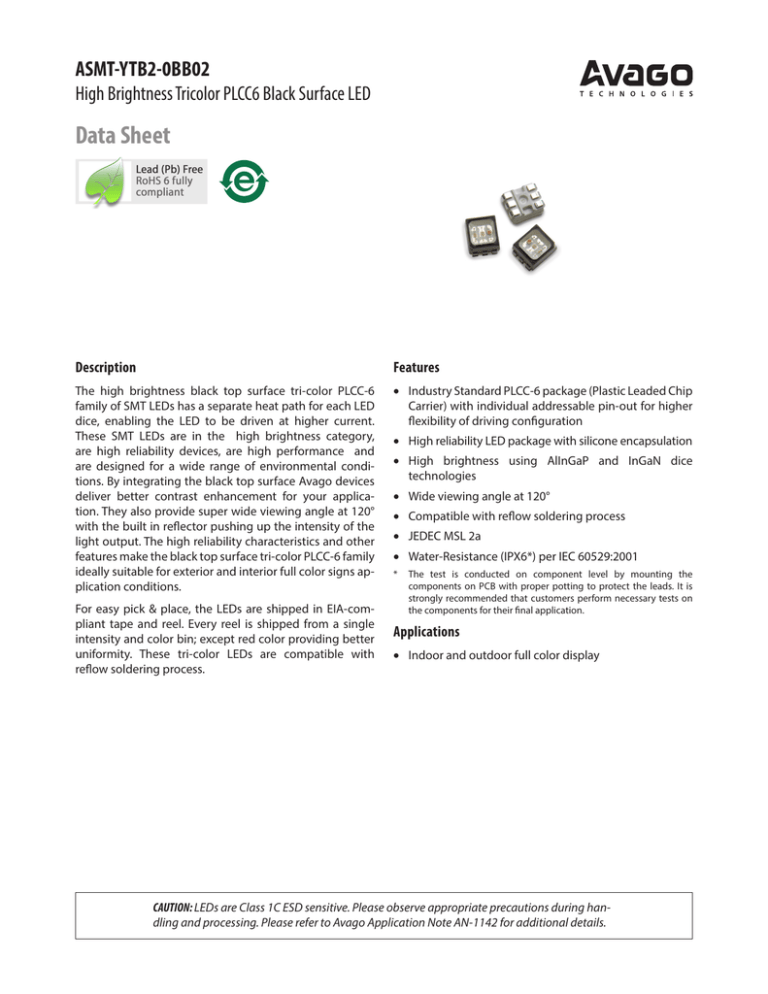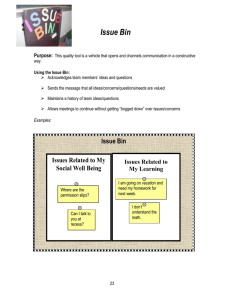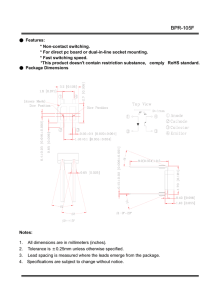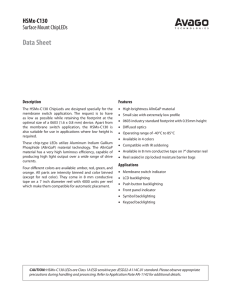
ASMT-YTB2-0BB02
High Brightness Tricolor PLCC6 Black Surface LED
Data Sheet
Description
Features
The high brightness black top surface tri-color PLCC-6
family of SMT LEDs has a separate heat path for each LED
dice, enabling the LED to be driven at higher current.
These SMT LEDs are in the high brightness category,
are high reliability devices, are high performance and
are designed for a wide range of environmental conditions. By integrating the black top surface Avago devices
deliver better contrast enhancement for your application. They also provide super wide viewing angle at 120°
with the built in reflector pushing up the intensity of the
light output. The high reliability characteristics and other
features make the black top surface tri-color PLCC-6 family
ideally suitable for exterior and interior full color signs application conditions.
• Industry Standard PLCC-6 package (Plastic Leaded Chip
Carrier) with individual addressable pin-out for higher
flexibility of driving configuration
For easy pick & place, the LEDs are shipped in EIA-compliant tape and reel. Every reel is shipped from a single
intensity and color bin; except red color providing better
uniformity. These tri-color LEDs are compatible with
reflow soldering process.
• High reliability LED package with silicone encapsulation
• High brightness using AlInGaP and InGaN dice
technologies
• Wide viewing angle at 120°
• Compatible with reflow soldering process
• JEDEC MSL 2a
• Water-Resistance (IPX6*) per IEC 60529:2001
* The test is conducted on component level by mounting the
components on PCB with proper potting to protect the leads. It is
strongly recommended that customers perform necessary tests on
the components for their final application.
Applications
• Indoor and outdoor full color display
CAUTION: LEDs are Class 1C ESD sensitive. Please observe appropriate precautions during handling and processing. Please refer to Avago Application Note AN-1142 for additional details.
Package Dimensions
Lead Configuration
3
5
2
6
1
0.50
4
2.30
2.30
2.80
2.30
3.00
3.40
1.80
4
5
6
0.20
2
Green
Cathode
Blue
2
Cathode
Green
3
Cathode
Red
4
Anode
Red
5
Anode
Green
6
Anode
Blue
Notes:
1. All Dimensions are in millimeters
2. Tolerance = ±0.2 mm unless otherwise specified
3. Terminal Finish: Ag plating
4. Encapsulantion material: silicone resin
3
Red
1
1
Blue
0.90
Table 1. Device Selection Guide
Color 1 - AlInGaP Red
Min. Iv
@20mA
Part Number
ASMT-YTB2-0BB02
Bin ID (mcd)
U2
560
Color 2 - InGaN Green
Typ. Iv
Max Iv
@ 20mA @ 20mA
(mcd)
(mcd)
745
1125
Color 3 - InGaN Blue
Min. Iv
@ 20mA
Typ. Iv
@ 20mA
Max Iv
@ 20mA
Min. Iv
@ 20mA
Typ. Iv
@ 20mA
Max Iv
@ 20mA
Bin ID (mcd)
(mcd)
(mcd)
Bin ID (mcd)
(mcd)
(mcd)
1600
2240
380
560
W1
1125
T1
285
Notes:
1. The luminous intensity IV, is measured at the mechanical axis of the LED package and it is tested in pulsing condition. The actual peak of the spatial
radiation pattern may not be aligned with this axis.
2. Tolerance = ± 12%
Part Numbering System
ASMT –Y TB2 – X1 X2 X3 X4 X5
Packaging Option
Color Bin Selection
Intensity Bin Limit
Intensity Bin Selection
Device Specification Configuration
Package Type
B: Black Surface Tricolor
Color
T: Tricolor
Produce Family
Y: Silicone Based PLCC6
2
Table 2. Absolute Maximum Ratings (TA = 25°C)
Parameter
Red
Green & Blue
Unit
50
30
mA
100
100
mA
114
mW
DC forward current [1]
Peak forward current [2]
Power dissipation
125
Reverse voltage
4V[3]
V
Maximum junction temperature Tj max
125
°C
-40 to + 110[4]
°C
-40 to + 120
°C
Operating temperature range
Storage temperature range
Notes:
1. Derate linearly as shown in Figure 4a & 4b.
2. Duty Factor = 10% Frequency = 1KHz
3. Driving the LED in reverse bias condition is suitable for short term only
4. Refer to Figure 4a and figure 4b for more information
Table 3. Optical Characteristics (TA = 25°C)
Dominant Wavelength,
λd (nm) [1]
Peak Wavelength,
λp (nm)
Viewing Angle
2θ½[2] (Degrees)
Luminous Efficacy
ηV[3] (lm/W)
Luminous Efficiency
ηe (lm/W)
Color
Min
Typ.
Max
Typ.
Typ.
Typ.
Typ.
Red
618
622
628
629
120
210
43
Green
525
530
537
521
120
535
75
Blue
465
470
477
464
120
84
15
Notes:
1. The dominant wavelength is derived from the CIE Chromaticity Diagram and represents the perceived color of the device.
2. θ½ is the off axis angle where the luminous intensity is ½ the peak intensity
3. Radiant intensity, Ie in watts / steradian, may be calculated from the equation Ie = IV / ηV, where IV is the luminous intensity in candelas and ηV is
the luminous efficacy in lumens / watt.
4. ΦV is the total luminous flux output as measured with an integrating sphere at mono pulse condition.
Table 4. Electrical Characteristics (TA = 25°C)
Forward Voltage,
VF (V) [1]
Reverse Voltage
VR @ 100mA
Reverse Voltage
VR @ 10mA
Thermal Resistance
RθJ-P (°C/W) [2]
Min.
Typ
Color
Min
Typ.
Max.
Min.
Red
1.80
2.10
2.50
4
–
280
Green
­2.80
3.20
3.80
–
4
180
Blue
2.80
3.20
3.80
–
4
180
Notes:
1. Tolerance ± 0.1V.
2. One chip on thermal resistance
3
100
0.8
80
BLUE
0.6
GREEN
FORWARD CURRENT-mA
RELATIVE INTENSITY
1.0
RED
0.4
0.2
0.0
400
450
500
550
600
WAVELENGTH - nm
650
RELATIVE LUMINOUS INTENSITY
(NORMALIZED AT 20mA)
Figure 1. Relative Intensity vs Wavelength
5.0
4.5
4.0
3.5
3.0
2.5
2.0
1.5
1.0
0.5
0.0
60
Blue /
Green
40
20
0
700
Red
0
1
2
3
FORWARD VOLTAGE-V
4
5
Figure 2. Forward Current-mA vs Forward Voltage-V
Red
Blue
Green
0
20
40
60
80
DC FORWARD CURRENT-mA
100
120
Figure 3. Relative Intensity vs Forward Current
60
AlInGaP
50
MAX ALLOWABLE CURRENT - mA
MAX ALLOWABLE CURRENT-mA
60
40
InGaN
30
20
10
0
0
20
40
60
80
AMBIENT TEMPERATURE (°C)
100
Figure 4a. Maximum forward current vs. ambient temperature.
Derated based on TJMAX = 125°C. (3 chips)
4
120
AlInGaP
50
40
InGaN
30
20
10
0
0
20
40
60
80
AMBIENT TEMPERATURE (°C)
100
Figure 4b. Maximum forward current vs. ambient temperature.
Derated based on TJMAX = 125°C. (single chip)
120
1.0
0.8
0.8
NORMALIZED INTENSITY
NORMALIZED INTENSITY
1.0
0.6
0.4
0.2
Red
0.0
-90
-60
Green
0.6
0.4
0.2
Blue
-30
0
30
ANGULAR DISPLACEMENT-DEGREE
Red
60
0.0
-90
90
Figure 5a. Radiation Pattern for X axis
-60
Green
Blue
-30
0
30
60
ANGULAR DISPLACEMENT-DEGREE
90
Figure 5b. Radiation Pattern for Y axis
Y
X
X
Y
Figure 5c. Component Axis for Radiation Patterns
0.3
1
0.1
-40
Red
-20
Green
Blue
0
20
40
60
80 100
TJ - JUNCTION TEMPERATURE - °C
Figure 6. Relative Intensity vs Junction Temperature
5
FORWARD VOLTAGE SHIFT- V
NORMALIZED LOP at TJ =25°C
10
120
140
0.2
0.1
0
-0.1
-0.2
-0.3
-0.4
-40
Red
-20
Green
Blue
0
20
40
60
80 100
TJ - JUNCTION TEMPERATURE - °C
Figure 7. Forward Voltage vs Junction Temperature
120
140
1.35
4.35
4.35
4.35
1.60
5.25
0.50
0.40
0.50
0.40
2.35
4.35
1.60
Figure 8. Recommended soldering land pattern.
Package
Marking
4.00 ±0.10
2.00 ±0.05
4.00 ±0.10
1.50
1.75 ±0.10
+0.10
–0
2.29 ±0.1
3.50 ±0.05
8.00
3.05 ±0.10
1.00
+0.10
–0
6
3.81 ±0.10
0.229 ±0.01
8°
Figure 9. Carrier tape Dimension
+0.30
–0.10
+0.5
Ø 20.5 ±0.3
2 –0
62.5 +0
–2.5
180
Ø 13 ±0.2
8.4 +1.50
–0.00 (MEASURED AT OUTER EDGE)
14.4 (MAX. MEASURED AT HUB)
LABEL AREA (111 mm x 57 mm)
WITH DEPRESSION (0.25 mm)
7.9 (MIN.)
10.9 (MAX.)
Figure 10. Reel Dimension
USER FEED DIRECTION
PIN 1
PRINTED LABEL
Figure 11. Reeling Orientation
7
Packaging Label:
(i) Avago Mother Label (Available on MBB bags)
STANDARD LABEL LS0002
RoHS Compliant Halogen Free
e4 Max Temp 260C MSL2a
(1P) Item: Part Number
(Q) QTY: Quantity
(1T) Lot: Lot Number
LPN:
CAT: Intensity Bin
(9D)MFG Date: Manufacturing Date
BIN: Color Bin
(P) Customer Item:
(V) Vendor ID:
(9D) Date Code: Date Code
DeptID:
Made In: Country of Origin
(ii) Avago Baby Label (Available on reel)
(1P) PART #: Part Number
BABY LABEL COSB001B V0.0
(1T) LOT #: Lot Number
(9D)MFG DATE: Manufacturing Date
QUANTITY: Packing Quantity
C/O: Country of Origin
(9D): DATE CODE:
D/C: Date Code
VF:
CAT: INTENSITY BIN
BIN: COLOR BIN
(1T) TAPE DATE:
Example indicates luminous Intensity information for Red,
Green and Blue respectively from label:
CAT: V1 W1 T2
Example indicates color bin information for Green and
Blue from label:
BIN: A B
Intensity for Blue
Intensity for Green
Intensity for Red
Color Bin for Blue
Color Bin for Green
Note: There will be no red color bin information appear on label as it is not binned and support with full distribution range.
8
Intensity Bin Selection (X2, X3)
Intensity Bin Limit
Individual reel will contain parts from 1 half bin only
Bin ID
Min (mcd)
Max (mcd)
Min Iv Bin (Minimum Intensity Bin)
T1
285.0
355.0
X2
Red
Green
Blue
T2
355.0
450.0
B
U2
W1
T1
U1
450.0
560.0
U2
560.0
715.0
V1
705.0
900.0
V2
900.0
1125.0
W1
1125.0
1400.0
W2
1400.0
1800.0
X1
1800.0
2240.0
Number of Half Bin from X2
X3
Red
Green
Blue
B
3
3
3
Color Bin Selection (X4)
Individual reel will contain parts from 1 full bin only
Tolerance for each bin limits is ±12%
Color Bin Combinations
X4
Red
Green
Blue
0
Full
distribution
A, B, C
A, B, C, D, E
Color Bin Limits
Red Color Bin Table
Bin ID
Full
Distribution
Blue Color Bin Table
Min. Max.
Dom Dom 618
x
0.6873 0.6696 0.6866 0.7052
y
0.3126 0.3136 0.2967 0.2948
628
Tolerance of each bin limit is ± 1 nm
Green Color Bin Table
Max.
Dom
Min.
Dom
Max.
Dom
A
465.0 469.0 x
Bin ID
A
525.0 531.0 x
0.1142 0.1799 0.2138 0.1625
y
0.8262 0.6783 0.6609 0.8012
B
528.0 534.0 x
0.1387 0.1971 0.2298 0.1854
y
0.8148 0.6703 0.6507 0.7867
C
531.0 537.0 x
0.1625 0.2138 0.2454 0.2077
y
0.8012 0.6609 0.6397 0.7711
Tolerance of each bin limit is ± 1 nm
1
2
3
0.1355 0.1751 0.168
4
0.127
y
0.0399 0.0986 0.1094 0.053
B
467.0 471.0 x
0.1314 0.1718 0.1638 0.122
y
0.0459 0.1034 0.1167 0.063
C
469.0 473.0 x
y
Min.
Dom
9
Bin ID
D
E
0.1267 0.168
0.1593 0.116
0.0534 0.1094 0.1255 0.074
471.0 475.0 x
0.1215 0.1638 0.1543 0.1096
y
0.0626 0.1167 0.1361 0.0868
473.0 477.0 x
0.1158 0.1593 0.1489 0.1028
y
0.0736 0.1255 0.1490 0.1029
Tolerance of each bin limit is ± 1 nm
Packaging Option (X5)
Option
Test Current
Reel Size
2
20mA
7 inch
Soldering
Recommended reflow soldering condition:
(i) Leaded reflow soldering:
(ii) Lead-free reflow soldering:
20 SEC. MAX.
183°C
100-150°C
-6°C/SEC.
MAX.
3°C/SEC.
MAX.
120 SEC. MAX.
60-150 SEC.
TIME
a. Reflow soldering must not be done more than 2 times.
Make sure the necessary precautions are observed for
handling moisture-sensitive device as stated in the
following section.
b. Recommended board reflow direction:
TEMPERATURE
TEMPERATURE
10 to 30 SEC.
240°C MAX.
3°C/SEC. MAX.
217°C
200°C
255 - 260 °C
3°C/SEC. MAX.
6°C/SEC. MAX.
150°C
3 °C/SEC. MAX.
100 SEC. MAX.
60 - 120 SEC.
TIME
c. Do not apply any pressure or force on the LED during
reflow and after reflow when the LED is still hot.
d. It is preferred to use reflow soldering to solder the LED.
Use hand soldering for rework if this is unavoidable,
but it must be strictly controlled to the following
conditions:
- Soldering iron tip temperature = 320 °C max
- Soldering duration = 3 sec max
- Number of cycles = 1 only
- Power of soldering iron = 50 W max
e. Do not touch the LED body with hot soldering iron
except the soldering terminals as it may cause damage
to the LED.
f. For de-soldering, it is recommended that you use a
double flat tip.
g. You are advised to confirm beforehand whether hand
soldering will affect the functionality and performance
of the LED.
REFLOW DIRECTION
10
PRECAUTIONARY NOTES
1. Handling precautions
2. Handling of moisture-sensitive device
The encapsulation material of the LED is made of silicone
for better product reliability. Compared to epoxy encapsulant, whichis hard and brittle, silicone is softer and
flexible. Special handling precautions must be taken
during assembly of silicone encapsulated LED products.
Failure to comply might lead to damage and premature
failure of the LED. For more information. refer to Application Note AN5288, Silicone Encapsulation for LED: Advantages and Handling Precautions.
This product has a Moisture Sensitive Level 2a rating per
JEDEC J-STD-020. For additional details and a review of
proper handling procedures, refer to Avago Application
Note AN5305, Handling of Moisture Sensitive Surface Mount
Devices.
a. Before use
- An unopened moisture barrier bag (MBB) can be
stored at < 40 °C/90% RH for 12 months. If the actual
shelf life has exceeded 12 months and the Humidity
Indicator Card (HIC) indicates that baking is not
required, then it is safe to reflow the LEDs per the
original MSL rating.
a. Do not poke sharp objects into the silicone encapsulant.
Sharp objects such as tweezers or syringes might exert
excessive force or even pierce through the silicone and
induce failures in the LED die or wire bond.
b. Do not touch the silicone encapsulant. Uncontrolled
force acting on the silicone encapsulant might result in
excessive stress on the wire bond. Hold the LED only by
its body.
- It is recommended that the MBB not be opened
before assembly (e.g., for IQC).
b. Control after opening the MBB
- The HIC shall be read immediately upon opening of
the MBB.
c.Do no stack assembled PCBs together. Use an
appropriate rack to hold the PCBs.
d.The surface of silicone materials attracts more dust
and dirt than to epoxy, due to its surface tackiness. To
remove foreign particles on the surface of silicone, a
cotton bud can be used with isopropyl alcohol (IPA).
During cleaning, rub the surface gently without putting
much pressure on the silicone. Ultrasonic cleaning is
not recommended.
e. For automated pick and place, Avago has tested that the
following nozzle size works fine with this LED. However,
due to possible variations in other parameters such
as pick and place machine maker/model and other
settings of the machine, it is recommended that you
verify that the nozzle selected will not cause damage
to the LED.
- The LEDs must be kept at < 30 °C/60% RH at all
times and all high temperature related processes
including soldering, curing or rework need to be
completed within 672 hours.
c. Control for unfinished reel
- Unused LEDs must be stored in a sealed MBB with
desiccant or desiccator at < 5% RH.
d. Control of assembled boards
- If the PCB soldered with the LEDs is to be subjected
to other high temperature processes, the PCB
must be stored in a sealed MBB with desiccant or
desiccator at < 5% RH to ensure that all LEDs have
not exceeded their floor life of 672 hours.
e. Baking is required if:
- The HIC indicator is not BROWN at 10% and is AZURE
at 5%.
- The LEDs are exposed to a condition of >30 °C / 60%
RH at any time.
- The LED floor life exceeded 672 hrs.
ID
OD
ID = 1.7mm
OD = 3.5mm
11
The recommended baking condition is: 60 ± 5 °C for 20
hrs. Baking should only be done once.
f.Storage
- The soldering terminals of these Avago LEDs are
silver plated. If the LEDs are exposed in an ambient
environment for too long, the silver plating
might be oxidized and thus affect its solderability
performance. As such, unused LEDs must be kept in
a sealed MBB with desiccant or in desiccator at < 5%
RH.
3. Application precautions
a.Drive current of the LED must not exceed the
maximum allowable limit across temperature as
stated in the datasheet. Constant current driving is
recommended to ensure consistent performance.
The complication of using this formula lies in TA and
RqJ-A. Actual TA is sometimes subjective and hard to determine. RqJ-A varies from system to system depending
on design and is usually not known.
b. LED is not intended for reverse bias. Do use other
appropriate components for such purpose. When
driving the LED in matrix form, it is crucial to ensure
that the reverse bias voltage is not exceeding the
allowable limit of the LED.
Another way of calculating TJ is by using solder point
temperature TS as shown as follows:
c. Do not use the LED in the vicinity of material with
sulfur content, in environment of high gaseous
sulfur compound and corrosive elements. Examples
of material that may contain sulfur are rubber gasket,
RTV (room temperature vulcanizing) silicone rubber,
rubber gloves etc. Prolonged exposure to such
environment may affect the optical characteristics
and product life.
TS = LED solder point temperature as shown in the following illustration [°C]
TJ = TS + RqJ-S × IF × VFmax
where;
RqJ-S = thermal resistance from junction to solder point
[°C/W]
d.Avoid rapid change in ambient temperature
especially in high humidity environment as this will
cause condensation on the LED.
e.Although the LED is rated as IPx6 according to
IEC60529: Degree of protection provided by
enclosure, the test condition may not represent
actual exposure during application. If the LED
is intended to be used in outdoor or harsh
environment, the LED must be protected against
damages caused by rain water, dust, oil, corrosive
gases, external mechanical stress, and so on.
4. Thermal management
Optical, electrical and reliability characteristics of LED
are affected by temperature. The junction temperature
(TJ ) of the LED must be kept below allowable limit at all
times. TJ can be calculated as follows:
TJ = TA + RqJ-A × IF × VFmax
where;
TA = ambient temperature [°C]
RqJ-A = thermal resistance from LED junction to ambient
[°C/W]
IF = forward current [A]
VFmax = maximum forward voltage [V]
Ts point - pin 5
TS can be measured easily by mounting a thermocouple on the soldering joint as shown in illustration above,
while RqJ-S is provided in the datasheet. User is advised
to verify the TS of the LED in the final product to ensure
that the LEDs are operated within all maximum ratings
stated in the datasheet.
5. Eye safety precautions
LEDs may pose optical hazards when in operation. It is
not advisable to view directly at operating LEDs as it
may be harmful to the eyes. For safety reasons, use appropriate shielding or personal protective equipments.
6. Disclaimer
Avago’s products are not specifically designed, manufactured or authorized for sale as parts, components
or assemblies for the planning, construction, maintenance or direct operation of a nuclear facility or for
use in medical devices or applications. Customer is
solely responsible, and waives all rights to make claims
against Avago or its suppliers, for all loss, damage,
expense or liability in connection with such use.
DISCLAIMER: Avago’s products and software are not specifically designed, manufactured or authorized for sale
as parts, components or assemblies for the planning, construction, maintenenace or direct operation of a
nuclear facility or for use in medical devices or applications. Customer is solely responsible, and waives all rights to
make claims against avago or its suppliers, for all loss, damage, expense or liability in connection with such use.
For product information and a complete list of distributors, please go to our web site: www.avagotech.com
Avago, Avago Technologies, and the A logo are trademarks of Avago Technologies in the United States and other countries.
Data subject to change. Copyright © 2005-2014 Avago Technologies. All rights reserved.
AV02-2583EN - September 11, 2014



